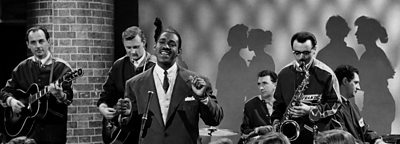From the outset, music formed a central part of the ���˿���’s mission to entertain. A cursory glance at the Radio Times in the 1920s, for example, shows that more hours were devoted to broadcasting music than any other category of programming.
But its place in the schedules and, by extension, in the nation’s consciousness exercised the minds of programme-makers and managers throughout the ���˿���. Stemming, perhaps, from his distrust of the frivolous, his strong moral convictions, or maybe his concern over Americanisation, the ���˿���’s first Director-General John Reith was deeply worried by the popularity of jazz in the 1930s and noted in his diary that 'Germany has banned hot jazz and I'm sorry that we should be behind in dealing with this filthy product of modernity.'
The experience of listening was also a hotly debated topic. Was it realistic to expect audiences to stop what they were doing and focus on music broadcasts, to the exclusion of all else? Or, would music would become ‘’, something that was on in the background whilst the listener was doing other tasks? Meanwhile, the advent of television provided a new opportunity for musical entertainment – a chance to reach new audiences and provide a visual as well as an aural experience for those watching and listening.
The Proms
The Promenade season of concerts was launched in 1895 and soon became synonymous with the name of composer and conductor Sir Henry Wood. Wood was keen to ensure that all sections of society were exposed to as wide a range of musical styles as possible.
This quasi-public service mission mirrored the ���˿���’s own aspirations to inform, educate and entertain, and in 1927, the Corporation took over the organisation and funding of the Proms due to Chappell & Co. withdrawing financial support. The partnership was cemented by the formation of the ���˿��� Symphony Orchestra and placed music at the heart of the cultural mission of the ���˿���.
The first televised Prom was The Last Night of the 1947 Proms season, with Sir Malcolm Sargent at the helm. Although the next televised Prom was not to be until 1953, the potential of television to open the Proms to a new audience had been understood. Here’s Sir William Glock speaking to Frank Gillard in 1983:
Music and Television
In 1963, Humphrey Burton was appointed Executive Producer, Music Programmes at the ���˿���. He joined the ���˿��� in 1955 as a trainee studio manager and in 1962 succeeded Huw Wheldon as editor of the arts programme, Monitor, and by 1965 he was the first Head of Music and Arts at the ���˿���.
Burton believed passionately in television and was a keen advocate of music on the medium. He was also a firm believer in the appeal of classical music to all classes of people, not just a cultural elite. Here he is talking with Frank Gillard in 1995:
When the ���˿���’s second channel, ���˿��� Two, was launched in April 1964, Burton played a key role in expanding the musical output on the channel. With schedules to be filled and opportunities to be taken, the ���˿��� provided a platform for different musical styles, including jazz in its programme Jazz 625 (a reference to the 625-line transmissions on the new channel). Humphrey Burton described the halcyon days of ���˿��� Two in his interview with Frank Gillard:
Six-Five Special
By the late 1950s, the ���˿��� and the government were under pressure to respond to changes not only in the broadcasting landscape – the arrival of ITV in 1955 resulted in a break in the television monopoly – but also wider social and cultural changes. One of the first casualties was the so-called ‘Toddlers’ Truce’.
This was a period between 6.00pm and 7.00pm where the government had decreed broadcasters were not permitted to broadcast programmes so as to allow parents to put children to bed without distraction. By early 1957, the Postmaster-General, Dr Charles Hill, decided that it was for parents – and not the State - to be responsible for putting children to bed and so the ‘truce’ was dissolved.
One of the programmes that filled the gap at 6.05pm after the early evening news on a Saturday evening was the ground-breaking Six-Five Special, a programme described by the Radio Times as being ‘designed for the young in spirit who like to keep abreast of topical trends in the world about them, with special emphasis on the world of entertainment’. The Radio Times also promised ‘plenty of music, in the modern manner, with rock ’n’ roll, skiffle groups, traditional jazz, featuring top musical groups and soloists’.
Hosted by Pete Murray and Jo Douglas (who also produced the programme along with Jack Good), the programme attracted around 12m viewers every week. Here, Pete Murray is talking with Mike Dick of the British Entertainment History Project about the early days of the show... and passing judgment on Lonnie Donegan’s choice of attire...
Dennis Main Wilson was also involved in the production of Six-Five Special. In his British Entertainment History Project interview with Alan Lawson and Norman Swallow in 1991, he recalls his experiences of working on the programme, including his memories of the sometimes unwieldy cameras in the studio:
The response to the programme was, on the whole, positive – at least with the younger viewers. Not surprisingly, maybe, ���˿��� audience research showed that as the viewer age increased, so satisfaction with the programme decreased.
There’s no doubt that Six-Five Special set the foundation for popular music shows that followed, including ITV’s Oh Boy! (produced by Jack Good when he left the ���˿��� to work for ABC Television) and Top of the Pops (1964-2006).
Eurovision Song Contest
Following the first meeting of the European Broadcasting Union (EBU) in 1955, a decision was made to instigate a pan-European song contest to promote post-war harmony and cooperation. On 24 May 1956, a competition was held in Switzerland and was won by... Switzerland! The UK, together with Austria and Denmark, were too late in submitting entries and so joined the competition the following year, which was held in Frankfurt, Switzerland having declined to host the event for a second time.
The ���˿���, as the UK’s national broadcaster, has taken a key role in the Contest since 1957. As well as hosting the event a number of times, including the first colour broadcast from the Royal Albert Hall in 1968, it was a former Head of Publicity at the ���˿���, George Campey, who first coined the term ‘’.
On 23 March 1963, the event was broadcast live from the new ���˿��� Television Centre in Wood Lane, London. Despite the fact that France had won the previous year, London was given an opportunity to host again (it had in 1960) following France’s hosting of the Contest in 1959 and 1961.
The responsibility for directing the Eurovision Song Contest in 1963 fell to Yvonne Littlewood. Yvonne had joined the ���˿��� in 1944 as a typist at Broadcasting House in Portland Place. She soon moved to the Television Service at Alexandra Palace as a production secretary.
It was not long before she became a producer herself, becoming the first female producer in Light Entertainment. Here she is in a ���˿��� Oral History Collection interview from May 2010, describing her plans for the big event, having to work around the fact that Europe’s largest television studio, TC1, was not operational by this point:
The UK’s entry that year was Ronnie Carroll singing ‘Say Wonderful Things’, although the winning country was Denmark with the song ‘Dansevise’. Presenting the winners with their prize Stuart Hood, ���˿��� Television’s Controller of Programmes, marvelled at the ‘human skill, ingenuity, and inventiveness’ of a television programme being carried to European towns and cities thousands of miles apart.
Further reading
Humphrey Burton, In My Own Time: an autobiography (2021)
Jenny Doctor and David Wright, The Proms: a new history (2007)

